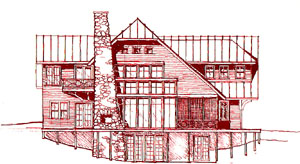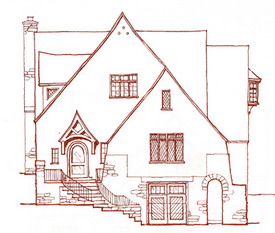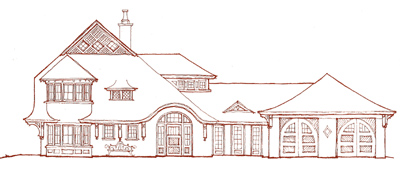I'm posting this and then running to a client meeting. I'll surely be back soon to respond to this series of issues as presented by Mark LePage, AIA, author of Living Well in Westchester. Let me first thank Mark for tackling these issues with a frank and open point of view. I encourage those who read this to respond in an equally frank way, as this is what is necessary for understanding...real communication. Here, then, is Mark's point of view about kitchen design and kitchen designers. Thanks, Mark!
The images are from Mark's website. What a wonderful repertoire. Here's Mark:
Susan asked me to post my thoughts on kitchen design and kitchen designers from an architect's point of view. My first thought was to decline in fear that I would get myself into trouble. My experience with kitchen designers in the past has rarely been positive. But then I thought, this might be a great opportunity to start a dialogue about the reasons for such negative experiences. So, let's talk...
Let me start off by introducing myself and writing a bit about my firm.

We started the firm in 1999. My partner's experience before Fivecat was designing very large, very custom, second and third summer homes for an elite clientele. With each project, she had the rare opportunity to custom design everything from the cabinet knobs to the cupola.
My experience was in residential construction (before architecture school) and as a project manager for a mid-sized architecture firm specializing in K-12 educational facilities (after school). With Annmarie's (my partner, who happens to also be my wife) design skills, and my construction and project management skills, we make a great team. We are also blessed with the best employees ever.
Being located in the heart of Westchester County, most of our works are additions and alterations. There's just not much land left to develop for new homes in these parts. Most of our additions and alterations include new kitchens. The contract agreement we execute allows our clients the option to work with an independent kitchen designer, and some do.
We have been designing custom kitchens for a long time, so the benefits of a client working with us on their kitchen are many. Besides our experience and design skills, the advantages provided by the continuity of a client working with the same designer throughout the project results in a consistent, integrated language throughout the house. The kitchen always works well with the rest of the project. Details, colors and style are consistent, as if it were a work of art with oils applied by the same hand.

Just like a modern house built in a neighborhood of historically accurate Victorians may disrespect its context and forever damage the fabric of that neighborhood, a kitchen designed with no relation to the intent and context of the house in which it is built will forever (or at least until the next renovation) damage the integrity of that house.
So, how can an independent kitchen designer successfully work with a residential architect? Here are three ingredients to a successful collaborative project (whether it be a custom kitchen or a Manhattan skyscraper).
Respect: Mutual respect for the skills, talents and experience of all parties (including the owner) involved in the project will allow the creation of the very best design. Respect always requires good communication...
Communication: My job as a residential architect working with an independent designer is to clearly communicate our intent for the overall project. Verbal and written communications should always be prepared and organized in a way so that they may be easily referenced throughout the project.
Organization: Create an easily understood, easily maintained system of documentation and communication. At Fivecat Studio we've created a Project Organizer System. Two binders, one for our client and one for us, are divided into sections labeled for each phase of the project. Every drawing, every letter, every document is easily filed and retrieved at anytime (even when the client is ready to hire us again, ten years from now, to perform the process all over again).
I could go on for pages more, but I don't want to use up all of Susan's bandwidth. I hope this is enough to get the conversation started. I look forward to reading your comments (don't hold back).
And Susan, thanks again for the opportunity to rant a bit...


